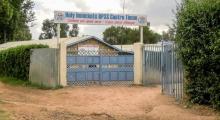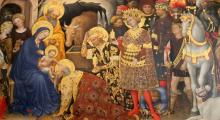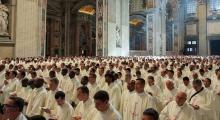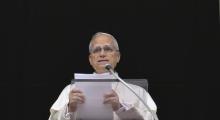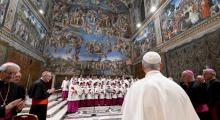Issued by the Catholic Center for Studies and Media - Jordan. Editor-in-chief Fr. Rif'at Bader - موقع أبونا abouna.org
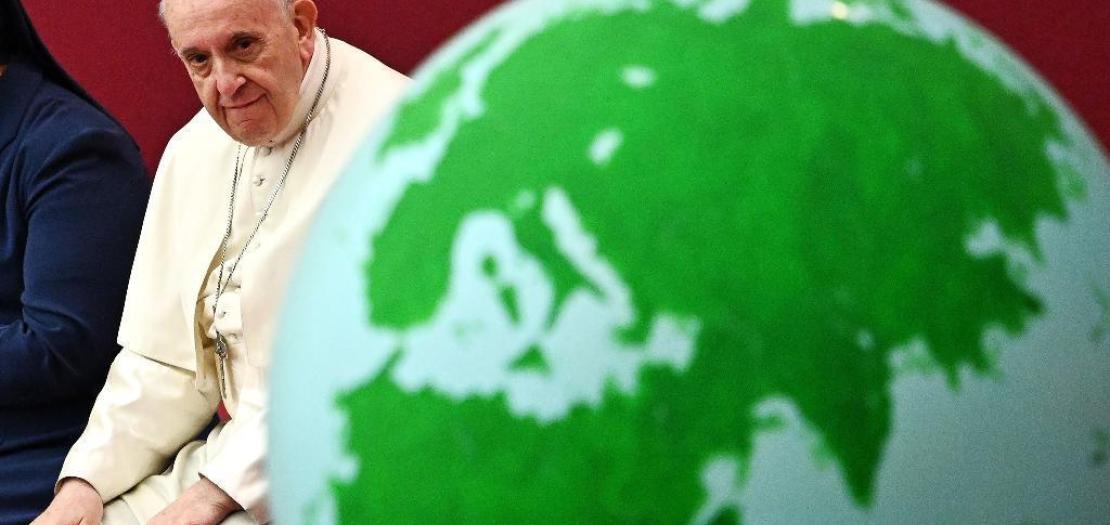
The message for the 52nd World Day of Peace on 1 January 2019: “Political addresses that tend to blame every evil on migrants and to deprive the poor of hope are unacceptable”. “Do not exclude young people from building the future of society”.
Corruption, misappropriation of public property, the exploitation of individuals, the denial of rights, the flouting of community rules, dishonest gain, the justification of power by force or the arbitrary appeal to raison d’état and the refusal to relinquish power. To which we can add xenophobia, racism, lack of concern for the natural environment, the plundering of natural resources for the sake of quick profit and contempt for those forced into exile. It is a long list of “vices” that today disfigure the face of politics that Pope Francis traces in his message for the 52nd World Day of Peace dedicated precisely to the theme of “good politics”, which will be celebrated next January 1, 2019.
The Pope does not mince his words: these vices are due “both to personal incompetence or to flaws in the system and its institutions”. The problem is that they “undermine credibility of political life overall, as well as the authority, decisions and actions of those engaged in it. “These vices, which weaken the ideal of an authentic democracy, bring disgrace to public life and threaten social harmony”, Francis affirms in the text signed on 8 December and published today, the day of the International Day on Migration promoted by the UN.
Once again the Pope pronounced his stigma against “Terror exerted over those who are most vulnerable” which, moreover, contributes “to the exile of entire populations who seek a place of peace”. “The Pope points out that “Political addresses that tend to blame every evil on migrants and to deprive the poor of hope are unacceptable”. Instead, “there is a need to reaffirm that peace is based on respect for each person, whatever his or her background, on respect for the law and the common good, on respect for the environment entrusted to our care and for the richness of the moral tradition inherited from past generations”.
This peace which, as the poet Charles Péguy affirmed, is “like a delicate flower struggling to blossom on the stony ground of violence”. “We know that the thirst for power at any price leads to abuses and injustice. Politics is an essential means of building human community and institutions, but when political life is not seen as a form of service to society as a whole, it can become a means of oppression, marginalization and even destruction”.
Francis recalls the words of Paul VI: “ “to take politics seriously at its different levels – local, regional, national and worldwide – is to affirm the duty of each individual to acknowledge the reality and value of the freedom offered him to work at one and the same time for the good of the city, the nation and all of humanity”.
In fact, he observes, “Political office and political responsibility thus constantly challenge those called to the service of their country to make every effort to protect those who live there and to create the conditions for a worthy and just future. If exercised with basic respect for the life, freedom and dignity of persons, political life can indeed become an outstanding form of charity”, as Pope Montini always defined it.
“Every Christian is called to practise charity in a manner corresponding to his vocation and according to the degree of influence he wields in the pólis “, the Pontiff remarks this time quoting his direct predecessor Benedict XVI. This is “a programme on which all politicians, whatever their culture or religion, can agree, if they wish to work together for the good of the human family and to practise those human virtues that sustain all sound political activity: justice, equality, mutual respect, sincerity, honesty, fidelity”.
Like wheat and tare, however, alongside these virtues there are many “vices”: “ corruption in its varied forms: the misappropriation of public resources, the exploitation of individuals, the denial of rights, the flouting of community rules, dishonest gain, the justification of power by force or the arbitrary appeal to raison d’état and the refusal to relinquish power. To which we can add xenophobia, racism, lack of concern for the natural environment, the plundering of natural resources for the sake of quick profit and contempt for those forced into exile”, the Pope denounces.
He then urged “to return to the original points of reference that inspire justice and law”: “Every election and re-election, and every stage of public life” represents such an opportunity. And added, “One thing is certain: good politics is at the service of peace. It respects and promotes fundamental human rights, which are at the same time mutual obligations, enabling a bond of trust and gratitude to be forged between present and future generations”.
With regard to the latter, the Pope emphasizes that the peculiarity of good politics is that of promoting “the participation of young people and trust in others”: “ When the exercise of political power aims only at protecting the interests of a few privileged individuals, the future is compromised and young people can be tempted to lose confidence, since they are relegated to the margins of society without the possibility of helping to build the future”.
When, on the other hand, “when politics concretely fosters the talents of young people and their aspirations, peace grows in their outlook and on their faces”. In this sense, “Politics is at the service of peace if it finds expression in the recognition of the gifts and abilities of each individual”.
Starting from this conviction, that is, that “ every woman, man and generation brings the promise of new relational, intellectual, cultural and spiritual energies”. That kind of trust is never easy to achieve, because human relations are complex, especially in our own times, marked by a climate of mistrust rooted in the fear of others or of strangers, or anxiety about one’s personal security. Sadly, it is also seen at the political level, in attitudes of rejection or forms of nationalism that call into question the fraternity of which our globalized world has such great need”.
The Bishop of Rome’s message does not lack a denunciation of the war, a hundred years after the end of the First World War: “ as we remember the young people killed in those battles and the civilian populations torn apart, we are more conscious than ever of the terrible lesson taught by fratricidal wars: peace can never be reduced solely to a balance between power and fear” he notes. “To threaten others is to lower them to the status of objects and to deny their dignity. This is why we state once more that an escalation of intimidation, and the uncontrolled proliferation of arms, is contrary to morality and the search for true peace”.
The Pope’s greatest concern is for the children currently living in areas of conflict, and to all those who work to protect their lives and defend their rights. “ One out of every six children in our world is affected by the violence of war or its effects – he points out - even when they are not enrolled as child soldiers or held hostage by armed groups. The witness given by those who work to defend them and their dignity is most precious for the future of humanity”.
Finally, recalling the Universal Declaration of Human Rights, the seventieth anniversary of which is being celebrated these days, Pope Francis renews his call for peace - towards himself but also towards others: “ family members, friends, strangers, the poor and the suffering...”. - which “ is the fruit of a great political project grounded in the mutual responsibility and interdependence of human beings”, but which, at the same time, is “ also a challenge that demands to be taken up ever anew”.
In this regard Pope Francis recalls the “beatitudes of the politician” proposed by the Vietnamese Cardinal François-Xavier Nguyễn Vãn Thuận, who died in 2002 as a “faithful witness to the Gospel”, after having suffered years and years of imprisonment and persecution:
Blessed be the politician with a lofty sense and deep understanding of his role.
Blessed be the politician who personally exemplifies credibility.
Blessed be the politician who works for the common good and not his or her own interest.
Blessed be the politician who remains consistent.
Blessed be the politician who works for unity.
Blessed be the politician who works to accomplish radical change.
Blessed be the politician who is capable of listening.
Blessed be the politician who is without fear
To read full text of Pope Francis’ message for the 52nd World Day of Peace,please click:
http://en.abouna.org/en/content/text-pope-francis%E2%80%99-message-52nd…


